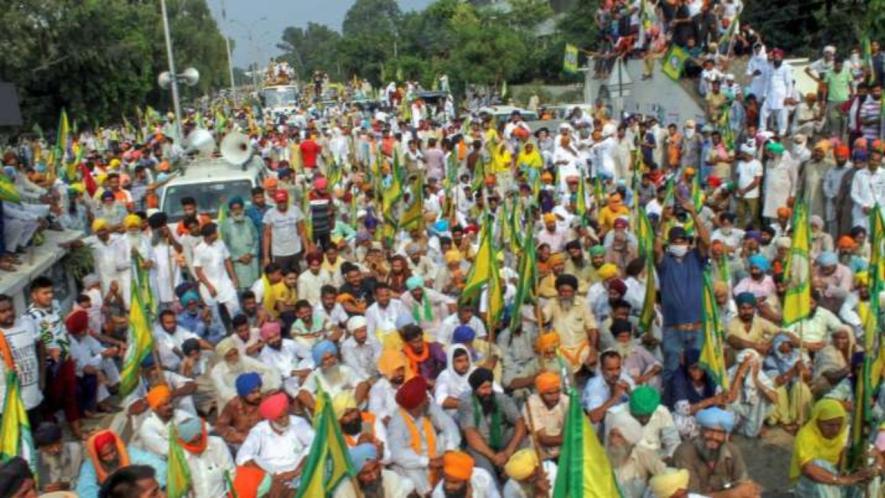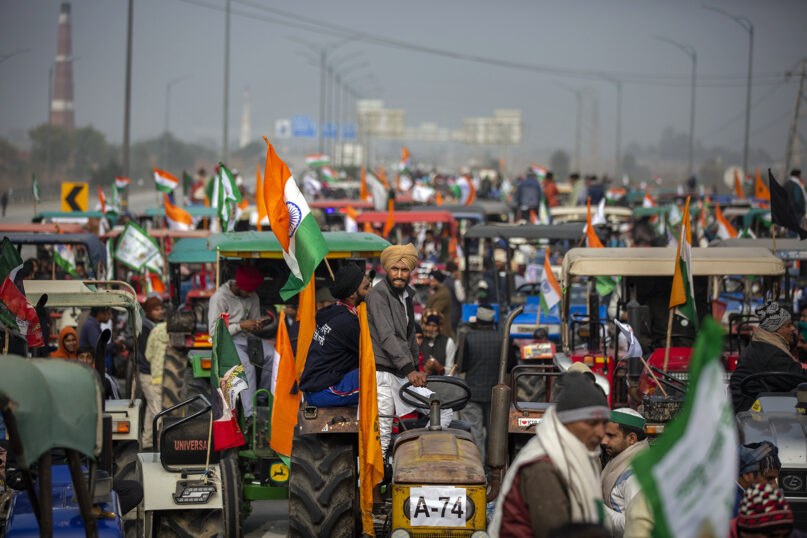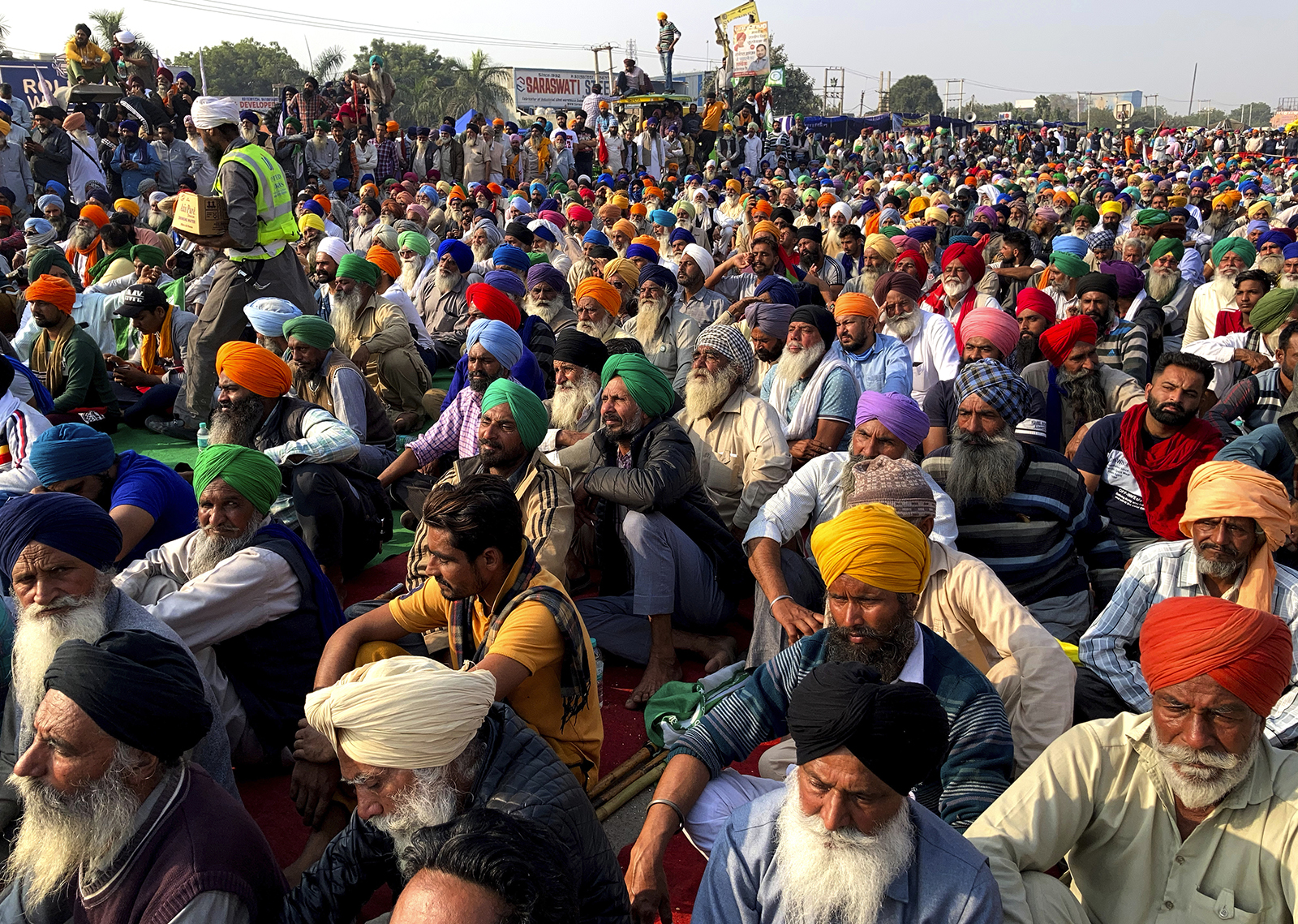
CBC
In the wake of clashes between demonstrators and police in Delhi on Jan. 26, India's Republic Day, the government has been pushing back against the tens of thousands of farmers protesting the nation's new agricultural laws.
The government shut down the internet in parts of Delhi and surrounding areas this week in a move to hamper the protests and their organizers.
"People are not able to communicate with each other, they can't call home, they don't know what is happening on a political level with regards to the movement," said Nidhi Suresh, a Delhi-based journalist who has been covering the protests for the past two-and-a-half months.
India's Ministry of Home Affairs said the crackdown was "in the interest of maintaining public safety and averting public emergency." Internet service was reportedly back in some areas Friday afternoon, but whether it will be cut again is unclear.
Security forces have also put up barricades to keep people from easily accessing the protest camps, some of which now span several kilometres.
India's Republic Day unrest marked a change in the tone of the ongoing protest, as huge crowds converged on the nation's capital. A group stormed the barricades at the historic Red Fort, resulting in violent clashes with police. At least one person died, and hundreds of police and protestors were reported injured.
Several journalists have also been charged with sedition over their coverage of the events.
The confrontation has compromised the movement's commitment to peaceful protest. Since then the farmers, many of whom are Sikhs from nearby Punjab, Haryana and Uttar Pradesh, have condemned the violence and have returned to camps located on major roadways bordering the nation's capital — Singhu, Tikri, and Ghazipur.
"[We] were disappointed by the violence on Republic Day. But we are still united. It's a bigger movement than just the farmers' leaders and the politicians," said a law student and farmer from Haryana, Bhupender Chaudhary.
"It's now a protest for all of the people."
Along with the three large border protests, sympathy demonstrations have also sprung up in recent months. The largest, on Nov. 26, saw some 250 million people participate in a general strike all over the country.
"I have marvelled at how brilliantly people from such humble backgrounds have been negotiating with the government," said Gurpreet Wasi, a volunteer with Khalsa Aid based in Delhi. "Despite having thousands of differences on the ground, they have really projected a unified front."

Agricultural reforms
The farmers are protesting new laws brought in by Prime Minister Narendra Modi's government in September. They say the bill will wipe out small farmers and give corporations far too much control of India's agricultural industry.
"For marginal, small farmers in places like Haryana, it's hard to sustain a living," said Chaudhary. "Their kids will starve if they get pushed out of the market."
Many farmers fear the government will eliminate the Minimum Support Price (MSP), which regulates the price of their crops. Modi has responded to this, saying the MSP will remain in place:
On Wednesday, Modi reiterated that his government has taken several steps to make India's farmers more "self-reliant" in the past six years.
So far, the Indian government has held several rounds of talks with leaders of the 40 farmers' unions fronting the movement. The leaders are demanding a complete repeal of the laws, but Delhi has only agreed to delay any reforms for 18 months.
Chaudhary, whose village grows chickpeas, wheat and mustard, has seen the challenges his community faces first hand. He was among the first to travel to nearby villages to explain the reforms and mobilize support. It started small.
"Sometimes we had only 10 people with us," he said.

India's massive agricultural sector, which employs 70 per cent of the working population, has been in crisis for years due to a number of factors including punishing droughts that have left already-indebted farmers with poor crop yields. Many have taken their own lives — the National Crime Records Bureau says that more than 10,000 farmers and farm labourers died by suicide in 2019 alone.
"For the last 10 to 12 years, there's been such a spate of farmer suicides," said Suresh.
The journalist points out that fighting the new laws is only part of their struggle.
"It's now a protest of dignity, it's a protest of who gets heard and who should be getting heard and what the due process is," she said. "Shouldn't affected parties and communities be consulted at all before such a bill is brought in?"
"It's the responsibility of the state to try and come up and hear their own people, and have a conversation that they can trust," added Meenakshi Ganguly, South Asian Director of Human Rights Watch. "But there is a huge trust deficit … which is why the conversations are not not coming to a satisfactory conclusion."
Security barricades

Chaudhary and his family have been at the Tikri border since November, where a large police presence surrounds the area. Police have now embedded nails in the ground to puncture the tires of vehicles that try to pass through.
"At first, there was fear and anxiety when we heard the news that the government was bringing in security forces," he said. "But they can't do anything now, there are too many of us."
At Singhu, heavy barricades and road closures make it impossible for anyone to access the camps. The police have dug up crater-like trenches along the route to make travel difficult.
"You have to walk almost two kilometres to get close, and once you're there they won't let you in and ask you to take a detour," Suresh said, adding that many journalists are afraid of getting arrested and detained when they get to the sites.
"It's a strategy to keep people out."
However, the security forces have also been reluctant to resort to violence.
"The one thing that the government appears to have tried very hard to do is ensure that security forces act with restraint," Ganguly said. "But the fact that it needs this sort of barricading of borders seems a little unfortunate, in terms of what the government was trying to achieve."

Inside the barricades, farmers and their families have set up shelters, community kitchens (a Sikh practice called langar), and even services like laundry, but the nights are cold, and running water and electricity are not always available.
With the road closures, local volunteers are unable to keep bringing in supplies like warm clothes and blankets from Delhi.
Besides the risk associated with COVID-19, people on the ground say sanitary conditions at the crowded camps are getting worse.
"Disease is something they are getting concerned about now," Suresh said, "because there's no proper sanitation and there's stagnation of water."
At least 70 farmers have died at the sites, according to the farmers unions, but there are no official government numbers and Suresh says some believe the toll is likely higher.
"Many of the farmers are old, some of them are struggling in the cold, some of them have had heart attacks," Chaudhary said.
The deaths have weighed on him.
"You naturally start to feel defeated, but we are carrying on."
Some villages, including Chaudhary's, have set up a system — if 10 people need to return home, then 10 people replace them at the border, allowing farmers to take care of their homes and tend to their crops.
Protestors are estimated to have brought in six months worth of rations, and they are mobilizing more support through grand village council meetings (panchayats) happening all around Delhi.
"As an eyewitness being there for the last two and a half months, I can say with full clarity that I don't see any dwindling of crowds," said Suresh.

Protest activities and government responses are also playing out online.
Internet blackouts like the one this week have become a pattern in India as a way for the government to address dissent. Statista reported that in 2018, India was by far the country that implemented the most internet shutdowns.
"It has become the go-to strategy when they want to contain any kind of public protest, because they believe a lot of communication and organizing occurs over the internet," Human Rights Watch's Ganguly said.
Meanwhile, a statement from India's Ministry of External Affairs also suggests the government is concerned that interest groups have "tried to mobilise international support against India." The government maintains that the farmer protests are an internal matter, after recent tweets of support for the protests from celebrities including Rihanna and Greta Thunberg.

And public support for the farmers' position isn't unanimous.
This week, along with attempts to block hundreds of protest-related accounts on social media that have become the driving force of the movement, there was a concerted pro-government hashtag campaign.
When NDP leader Jagmeet Singh thanked Rihanna for "empowering the voices of the oppressed" on Instagram, for example, a number of Indian officials and celebrities fired back using the hashtags #IndiaTogether and #IndiaAgainstPropaganda.
Cricket star Sachin Tendulkar wrote, "India's sovereignty cannot be compromised. External forces can be spectators but not participants."
Ultimately, online discourse isn't what Ganguly is concerned about.
"That's still in the peaceful conversation space," Ganguly said. "Our concern is almost always what happens if there is violence. And what happens in terms of state response, whether they are punishing dissent in any way."
There are more demonstrations expected in the coming days. The farmers say they refuse to stop protesting until they are properly consulted on agricultural reforms that they fear will have a huge impact on their lives.
"Our elders told us to stand our ground and said, look, we're not turning around and we're not going to be afraid," said Chaudhary. "So we don't plan on moving now. Our tractors and our trolleys are going to stay put."













